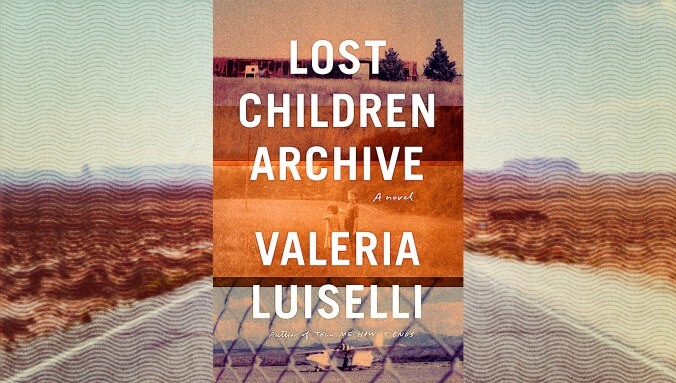A road novel. A critique of the United States’ immigration system. The protracted dissolution of a marriage. An epistolary collection. All of these stories (and more) can be found in Valeria Luiselli’s Lost Children Archive, her latest incredibly eloquent and ambitious novel. Luiselli’s philosophical and literary studies are brought to bear as much as her work as an interpreter for Central American migrants in this tale of a documentarian and documentarist (you’ll never know the difference, but this couple sure does) who drive their blended family from New York City to the U.S. Southwest, unaware that they’re also attempting to travel across time.
Though rendered in sterile, narrow white font, the title, Lost Children Archive, still leaps off the cover, “thanks” to the ongoing humanitarian crisis being promoted by the U.S. government at the Mexican border. More than the adults who trekked across thousands of miles in search of safety, who are being denied asylum and deported, it’s the children who come to mind when discussing this calamity. Children who are being torn from their parents’ arms and fed into an inhumane and incompetent system. Children who can’t be accounted for, who can’t (or won’t) be reunited with their families. For anyone who’s been keeping up with the news, these children will be fully formed in their imagination while reading Luiselli’s novel. But readers might have to adjust the time frame—the migrant children in Lost Children Archive could just as easily have come from Luiselli’s work as an interpreter, or be one of the unaccompanied minors who sought entrance into the U.S. in 2014.
As a Mexican author and a former interpreter, Luiselli possesses an invaluable perspective. She has an international and therefore long view on politics, which ensures that Lost Children Archive feels just as timeless as it is pertinent. “Lost” has multiple meanings, each more painful and resonant than the last. There’s the young daughter and stepson of the central woman in the story, who’s our first narrator and only referred to in the first-person or as “Ma”—the children are not alone, but they might soon be lost to each other. There is also a pair of Mexican girls trying to be reunited with their mother, whom the woman attempts to help, even as she hitches her wagon and audio equipment to her husband-for-now’s star. There are the “lost” or bygone children whose sounds Ma and her husband (otherwise referred to as “Pa,” especially once the boy takes over as narrator) recorded in an attempt to document the soul of New York. Then there are the thousands of children who remain nameless in the story, but who inspire the woman’s career change.
Reading Lost Children Archive, it’s hard not to marvel at Luiselli’s technique. A National Book Foundation’s 5 Under 35 honoree from 2014, she can swim in either end of the pool, distilling the essence of a years-long relationship or deeply held belief with just a few words as easily as she stretches the most fleeting of moments—the flash of a Polaroid camera, a change of heart—into a saga. There’s imagery within her imagery, creating a kind of literary photomosaic to accompany the granular exploration of the personal and professional motivations of a husband and wife who began to grow apart the moment they were no longer bound by work. But like the sunlight that pours in through the windshield on a journey westward, her writing, while dazzling, can sometimes make you lose sight of the very themes and relationships she’s developing. Luiselli’s prose is very considered; it often feels like she’s trying to find a way to tell the larger story in each sentence, rather than allowing them to accumulate. The author’s evocative description of the process of documentation unintentionally captures this shortcoming: “What you have, in the end, are all the moments, that didn’t form part of the actual experience.”
Lost Children Archive doesn’t fail for succeeding—beautiful writing is still beautiful writing—but the unintentional result is that the experimentation in form, switching from a kind of journaling to the more intimate firsthand account of a 10-year-old boy, can come off as oddly detached. Early on, in Ma’s first-person narrative, the lost migrant children are mentioned in passing; and once the boy takes over, he’s hardly equipped to deal with those harsh realities. Luiselli is plumbing undeniably painful depths, intertwining the uncertain future of these migrant children with that of the rapidly splintering family, trying to hold on to what remains of their relationship, so her occasionally clinical approach could just be a way of keeping the larger story in sight. But when Lost Children Archive concerns itself more with the destination than the journey, it loses its vitality.


 Keep scrolling for more great stories from The A.V. Club.
Keep scrolling for more great stories from The A.V. Club.